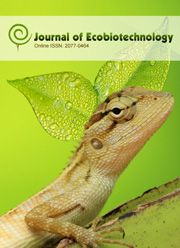Effect of various carbon sources on poly-β-hydroxybutyrate production by screened strains of Wautersia eutropha
Abstract
Selection of suitable substrate and optimizing the substrate concentration are pivotal parameters for biopolymer production in order to make it economically acceptable. Therefore, fructose, dextrose, propionate and methanol were taken under consideration to evaluate the effect of various carbon sources on poly-β-hydroxybutyrate [P(3HB)] production by screened strains of Wautersia eutropha (two mutagenized strains and wild-type organism). Wautersia eutropha M2 was determined to render high P(3HB) content at relatively low fructose concentration than wild-type organism. Maximum P(3HB) yields by wild-type Wautersia eutropha  and Wautersia eutropha M2 utilizing fructose were 59.58% and 60.28% respectively. P(3HB) yield by wild-type organism at 20 gL-1 fructose concentration (59.58%) was similar to that of P(3HB) yield by Wautersia eutropha M2 at 10 gL-1 fructose concentration (59.22%). A shift in degree of substrate specificity due to random mutagenesis was found in Wautersia eutropha M5 that utilized dextrose more efficiently than fructose (unlike wild-type Wautersia eutropha), rendering highest P(3HB) content (52.52%) during dextrose feeding. Increasing concentration of propionate showed inhibitory effect on bacterial growth and in vivo polymer accumulation in all the strains with highest yield of 36.76% at 8 gL-1 concentration by Wautersia eutropha M2. Methanol supported scanty growth and thus insignificant P(3HB) yields were reported by all the strains.



 .
.